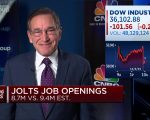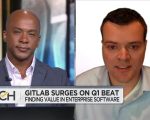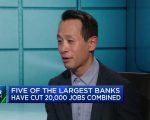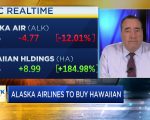A man walks past TSMC’s logo at the company’s headquarters in Hsinchu, Taiwan.
Sam Yeh | AFP | Getty Images
Taiwan Semiconductor Manufacturing Company reported a third-quarter profit of 211 billion New Taiwan dollars ($6.69 billion) on Thursday as weak demand for consumer electronics persists.
Even though it was the largest profit decline since the first quarter of 2019, the world’s largest contract chipmaker bested analysts’ expectations.
Here are TSMC’s third quarter results versus Refinitiv consensus estimates:
- Revenue: 546.73 billion New Taiwan dollars ($17.28 billion), vs. NT$540.39 billion expected
- Net income: NT$211 billion, vs. NT$191.43 billion expected
TSMC reported revenue slipped 10.83% from a year ago to NT$546.73 billion, while net income fell 24.87% from a year ago to NT$211 billion. That compares with TSMC’s guidance for third-quarter revenue between $16.7 billion and $17.5 billion.
“Our business was supported by the strong ramp of our industry-leading 3-nanometer technology and higher demand for 5-nanometer technologies, partially offset by customers’ ongoing inventory adjustment,” said TSMC in its earnings report.
The chip giant said that revenue increased 13.7% in the third quarter as compared to the second quarter.
In the second quarter, the Taiwanese firm reported a decline in quarterly profit for the first time in four years due to a post-pandemic plunge in the demand for consumer electronics like smartphones and laptops. But analysts have said chip inventories at smartphone and PC makers are running down and they expect restocking demand to come back.
During the earnings call on Thursday afternoon, CEO C.C. Wei said that the firm expects inventories to continue to decline.
“Due to the persistent weaker overall macroeconomic conditions and slow demand recovery in China, customers remain cautious in their inventory control. That’s why we expect the inventory digestion to continue in the fourth quarter,” said Wei.
“Having said that, we are observing some early signs of demand stabilization in the PC and smartphone market,” he added.
TSMC is the top producer of the world’s most advanced processors. The Taiwanese firm manufactures semiconductors for companies like Apple and Nvidia, that are often based on Arm architecture.
TSMC currently manufactures 3-nanometer chips and plans to start 2-nanometer mass production in 2025.
| Jim Cramer’s Investing Club shares what investors should listen for in a company’s earnings call
Smartphone market recovery
Canalys data showed that the global smartphone market slid just 1% in third quarter 2023, pointing to a slowdown in its decline. In the second quarter, the market plummeted 11% compared with the same period a year ago.
“Bolstered by regional recoveries and new product upgrade demand, the smartphone market recorded a double-digit sequential growth in Q3, ahead of the sales seasons,” said Canalys in a Tuesday report.
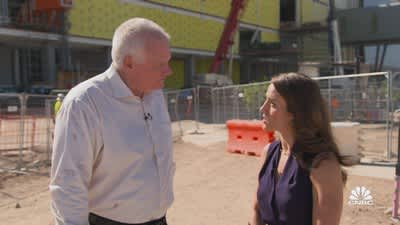
The demand for AI chips driven has boomed led by the proliferation of large language models such as ChatGPT and Chinese clones. That’s bolstered the shares of TSMC, which have surged 19% so far this year.
However, CEO Wei said that AI demand is “not enough to offset” the weakening demand for chips in consumer electronics.
“Moving into fourth quarter 2023, AI-related demand continues to be strong but it is not enough to offset the overall cyclicality of our business,” said Wei during the earnings call on Thursday.
“We expect our business in the fourth quarter to be supported by the continued strong ramp [up] of our 3-nanometer technology, partially offset by customers’ continued inventory adjustment on the inventory side,” he said.
TSMC expects fourth quarter revenue to come in between $18.8 billion to $19.6 billion.
Last week, the U.S. extended TSMC’s exemption from U.S. trade sanctions on China, allowing it to continue shipping advanced chip equipment for its operations there.

